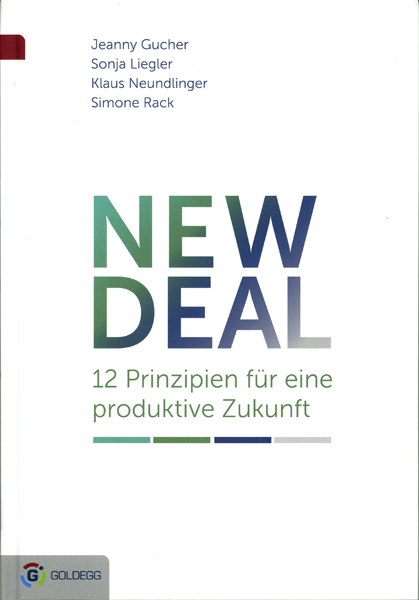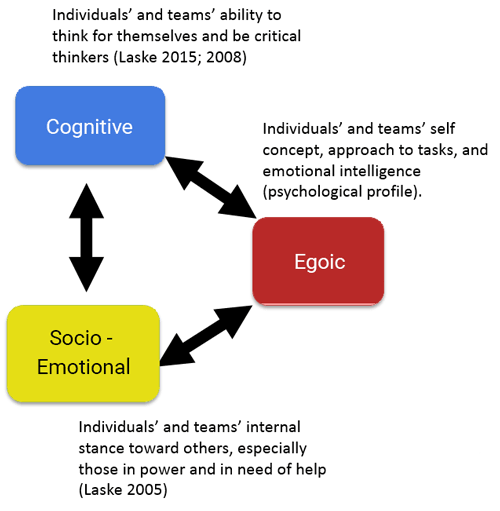In diesem Blog stelle ich die wichtigsten der von mir seit 2004 deutsch geschriebenen sozialwissenschaftlichen Texte und Lernmaterialien zusammen. Sie betreffen thematisch, was ich Lebensbefreiung nenne, in dem Sinne, dass sie es dem Leser ermoeglichen, sein oder ihr eigenes Leben entwicklungsmaessig in tieferer Weise als bloss psychologisch zu verstehen, naemlich auf 'epistemische' Weise, die die Art und Weise betrifft, in der sich jeder von uns seine eigene Welt schafft. Die Texte zeigen, wie jeder von uns eine lebenslange Entwicklung durchlaeuft, welche die dramatischen Veraenderungen unserer Erfahrung der realen Welt ("Wirklichkeit") als von uns selbst konstruiert, und also auch als von uns selbst verantwortet, darstellt. Sie enthalten zudem eine Ideologiekritik sowohl positivistischer wie spiritualistischer Ansaetze zur Erklaerung unseres Lebenslaufs und unserer Lebensprobleme. Methodologisch gesehen betreffen diese Schriften meine Arbeit mit dem Constructive Developmental Framework (CDF, 2000), einer sozial-wissenschaftlichen Methodologie, die human resources insofern revolutioniert, als sie erstmalig empirische Daten zum persoenlichen Entwicklungsstand von Mitarbeitern in Unternehmen zur Verfuegung stellt, die eine Grundlage nicht nur von Coaching, sondern auch von Karriereberatung und Team-Aufstellung werden koennen. Zudem leisted CDF auch im Privatleben Hilfestellung einfach deswegen, weil es zu einem Verstaendnis des persoenlichen Entwicklungsverlaufs und Entwicklungsstandes beitraegt, das weder von der Psychologie noch von... Read More...
Tag: Dialectical Thinking
Introduction to “Dynamic Collaboration: How to Strengthen Self-Organization and Collaborative Intelligence in Teams” (Jan De Visch & Otto Laske 2018)
This blog gives readers access to the Introduction to Jan DeVisch's and my book entitled Dynamic Collaboration: How to strengthen self organization and collaborative intelligence in teams, to be launched in May 2018 at the University of Antwerp, Belgium. In this book of five chapters, we deviate from the extant team literature by adopting an adult-developmental perspective and instead of "skills", "competences", and "agile" mantras and tool kits focus on the structure and quality of team dialog as the source of self-organization both in individuals and teams. We equate self-organization with being mature enough to be aware of the structure of one's emotions and thoughts as an expression of the level of one's adult development. To provide senior managers with new ways of thinking about teams and new kinds of interventions derived therefrom, we show that teams are always developmentally mixed -- composed of different developmental levels -- and dependent upon how team majority relates to team minority, are prone to being either up- or downwardly divided, rather than unified. We put at the disposition of senior managers a large set of tools unknown to them that derive from adult-developmental research at Harvard's Kohlberg School since 1975, showing them how... Read More...
NEW DEAL: A sociological consulting approach to humanistic management and deliberately developmental organization
This blog introduces a sociological approach to consulting to organizations, with a focus on social capital (Sozialkapital) as the indispensable foundation of value creation and social productivity. The approach, called New Deal, formulated in German (Gucher et al, 2015), is the fruit of new social science research, and is sponsored by Four Dimensions GmbH active in Vienna and Salzburg, Austria. New Deal represents a sociological approach in the sense that it sees work and value creation as a process by which social capital is constantly created as well as potentially destroyed in human interactions. To substantiate this insight New Deal introduces four "new economies" (not found in classical economy): of personal relationships, emotions, attention, and knowledge, respectively. According to this approach, managing the creation of social capital amounts to managing the four economies at all levels of an organization, whether it is hierarchical or not. The blog highlights what is fresh about New Deal in light of North American preferences for focusing on "getting the job done", or remaining in what CDF calls the "Task House". Reflecting on the New Deal approach from an adult-developmental perspective, the blog elucidates why "moving out of the Task House" is a requirement especially... Read More...
Accelerating Collaborative Intelligence: How to Manage the Transition to Self Organization
Teams and teamwork are the heart and soul of every organizational and institutional project. This is especially true for agile teams. It is not the individual performance or accomplishment that counts, but that of the team. Just like in team sports, the team succeeds and fails together. Up to now, little research on team collaboration that is grounded in empirical studies in adult development has been conducted and published. The topic is still a carefully avoided no-man's land. As a result, strategical advice given and practiced regarding team self organization has pervasively fallen far short of being effective. This is about to change due to the appearance of a forthcoming short book by Jan DeVisch, a professor at Flanders Business School, Antwerp, Belgium, and Otto Laske, Director of the Interdevelopmental Institute, Gloucester, MA, USA. Central to the book are the processes required not only for overcoming stuckness in teams but for developing collaborative intelligence in organizations now experimenting with self-organization in teams. The book is geared to CEOs and Board Members. Senior managers, rather than professional coaches, are considered the main actors. The book promotes the creation of enabling environments for self organizing teams. It serves as a guide to... Read More...
New Dialog Methods for Broad-Spectrum Systems Constellations: Comments on the Milano Workshop on Intelligenza Collaborativa Nel Team
As shown at and, on this website, at , a workshop on new dialog methods specifically for creating collaborative intelligence in teams will take place in Milano, Italy, on January 30-31,2018. The workshop is offered by Consulenza Evolutiva, Milano and its Altroove School, and staffed by Lorenzo Campese, Alessandro Rossi, and Otto Laske. The workshop is a pioneering first in that it introduces Broad-Spectrum Systems Constellations which broaden the focus of attention of conventional constellations as detailed in the attached pdf. The workshop is held both in Italian and English. Those interested in signing up for the workshop with Consulenza Evolutiva will find further details on the workshop process below. Broad-Spectrum Systems Constellations Read More...
Thought Form Constellations as Measures of Team Connectivity
In this article, the author proposes structural, rather than behavioral or emotional, measures of team connectivity and introduces the notion of "cognitive" or "structural" systems constellations. These measures are derived from DTF, his Dialectical Thought Framework, a methodology rooted in cognitive developmental research since 1975. In contrast to the contemporary team literature, and in a follow up of an article co-authored with Graham Boyd on Distributed Leadership found in a book forthcoming at Palmgrave Publishers, UK, (#aboutBook), the author focuses on measuring team connectivity based on a team's cognitive behavior graph in real time. The author teaches DTF to both individuals, especially as coaches, and teams, in hands-on workshops in English and German, and with the help of a translator also in Spanish and Italian. TF Constellations 2 Read More...



